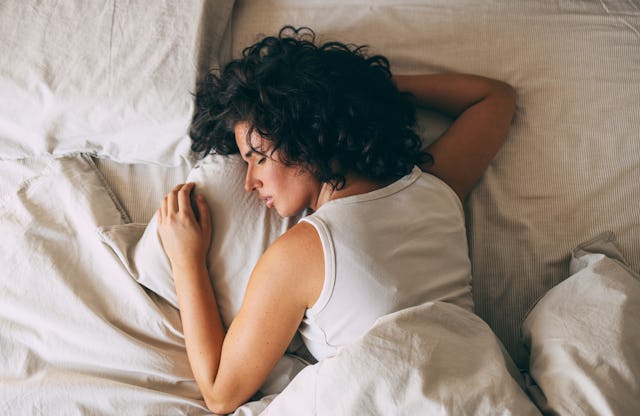Why Do I Drool When I Sleep? An Expert’s Answer
A little bit of drool is totally normal — but there are ways to reduce this nighttime annoyance.

Waking up to drool stains on your pillow is definitely not fun. Some people even find all of that nighttime saliva embarrassing. The good news is that everyone drools a little bit (even the ones in denial about it), so you're definitely not the only one thinking, Why do I drool when I sleep? Still, excess drooling can be more than an annoyance sometimes.
On average, people produce between 0.5 to 1.5 liters of saliva each day. That production doesn't stop just because you're asleep, either. As a result, some drool naturally escapes your mouth while sleeping.
Seeing drool on your pillow may make you groan, but it's usually just a byproduct of being human. That said, there are many reasons why bodies produce excess saliva, and if you ever feel like you're drooling more than usual, you should absolutely talk to your doctor. Ultimately, you know your body better than anyone else, and if something like nighttime drooling is causing you concern, there's no harm in speaking up about it at your next appointment.
For now, here are some reasons why you drool in your sleep, as well as some tips on how to keep drooling to a minimum.
Why do we drool in our sleep?
“Slobbering at night — gross, right? You wake up with a wet pillow and wonder, Why is this occurring? Some people never slobber, but some wake up with a pool. Is it chance, or is it a symptom of something about your health? As a sleep medicine and lung health physician, I am asked this question all the time. I work with people all day, helping them breathe and sleep better, from snoring to sleep apnea. Drooling may seem like a small thing, but sometimes it can be a big deal,” Dr. Emma Lin, a board-certified pulmonologist and sleep medicine specialist and co-founder of ReadyO2.com, tells Scary Mommy.
So, what’s the deal? Why do you keep waking up in a pool of your own drool?
“Your body is making saliva all the time,” says Lin. “It breaks down food and helps your mouth stay healthy. You swallow it mindlessly throughout the day. When you're asleep, the body's muscles relax, including the ones that keep the mouth together and allow for the act of swallowing. If the mouth is open, saliva can spill out. That is totally normal.”
In other words, it’s natural for saliva to gather in your mouth and for some of it to escape, which leads to those pesky drool stains. But while a bit of drool is normal, if you’re drooling excessively, it’s time to consider some other causes.
What are some possible reasons for excessive drooling?
Sometimes, drooling can be a symptom of an underlying medical condition, especially in older adults or those with neurological disorders. Other times, it can be caused by something as simple as your sleep position (back sleepers are the least likely to drool, while side sleepers and stomach sleepers are at the mercy of gravity).
According to Lin, here are a few other reasons why you might be finding drool on your pillow in the mornings:
Stuffy Nose or Allergies
“If your nose is congested by allergies, a cold, or even a sinus infection, you will breathe with your mouth. Breathing with your mouth is easier for the saliva to exit.”
Acid Reflux (GERD)
“Ever had a burning feeling in your chest after a meal? That’s acid reflux, also called GERD. It can make your body produce extra saliva, sometimes spilling out at night.”
Sleep Apnea
“I see this one on a regular basis as a sleep specialist. Sleep apnea is when your airway is obstructed as you sleep, making breathing difficult. Your brain then has to work twice as hard to ensure the air continues to flow, and this can interrupt your swallowing reflex. Drooling, snoring, and waking up tired are all indications of sleep apnea.”
Neurological Conditions
“Those with Parkinson’s, ALS, or a history of stroke may also find it hard to swallow at night. The salivary control muscles work less efficiently, leading to excessive drooling.”
How do you stop drooling in your sleep?
It may be annoying, but normal nighttime drooling isn’t a cause for concern or treatment. But if you keep waking up with a wet pillow and it’s bothering you, Lin has a few suggestions.
- Clear your nose. Use allergy medicine, nasal strips, or steam at night.
- Sleep on your back: Side sleeping will make the problem worse.
- Check for reflux: If you get heartburn, don't eat late and see a physician.
- Have yourself tested for sleep apnea: If you snore or you are tired during the day, a sleep test can be of help.
Although drooling at night isn’t necessarily a problem, it can signal something more serious. “As someone who helps individuals breathe and sleep better on a daily basis, I know that even the small things, like waking up with a wet pillow, can be a sign of a health issue. Listen to your body, and if something is not right, don't ignore it.”